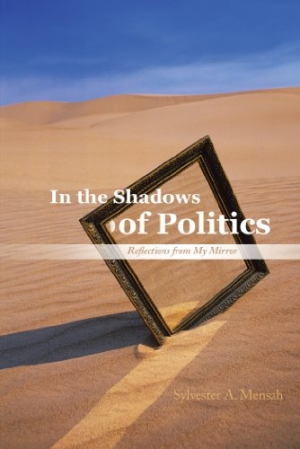In the Shadows of Politics
Reflections from My Mirror
From a childhood in Ghana through a career devoted to African politics, this memoir blends humor and rich detail to introduce a unique perspective on civic duty.
In the Shadows of Politics is a deeply personal and uniquely voiced story. Sylvester Mensah reflects on his life in and out of politics, his journey often paralleling the struggles in his native Ghana over the past fifty years.
Mensah is one of five sons born to a diplomat father, who died when the author was not quite twenty, and playwright-actress mother. In 1997, at age thirty-three, he was elected to Ghana’s parliament, becoming one of that body’s youngest members. When an opposing party came to power four years later, he was forced to adapt to a life without politics while he pursued educational opportunities and a variety of jobs in order to support his wife, Millie, and their four children. His personal story is entwined with that of his homeland, which was the first nation in sub-Saharan Africa to declare its independence from colonization in 1957.
Rich with personal details about his childhood—he and his brothers had a total of eighteen half-siblings—and schooling, this book traces Mensah’s entry into politics while still a young student, influenced deeply by his father’s service to the country’s first president. Mensah speaks candidly and earnestly about events, which cultivates the feeling of listening to a close friend.
Each chapter begins with a quote pertinent to the subject discussed. There are not many visuals; readers are limited to two photos of Mensah accompanying his mother when she received a national award and four reprints of newspaper articles detailing his father’s imprisonment in the Congo in 1960 and subsequent release following the United Nations’ intervention.
Mensah writes with a sense of humor about his father’s three-year stretch of unemployment: “In short, the ‘luxury’ of having three meals a day was reviewed, and the new order was that we ate twice a day, and even then, only if we were hungry.”
Cultural traditions are mentioned, offering a glimpse into the author’s world. For example, Mensah details how he and Millie’s courtship unfolded while he still lived with his strong-willed mother, whom everyone referred to as “Auntie.” One day, he came home to find his mother had repossessed his bed frame: “It was a big issue for me because, at the time, owning a full bed was the mark of a responsible man; as it stood then, my ability as a man was being called into question.”
Also highlighted are some of the author’s speeches and activities while serving as a member of parliament. He is now back in government, leading Ghana’s National Health Insurance Scheme (NHIS).
For those interested in politics or history, this is a good introduction to one man’s story about his life, family, faith, and country over the past fifty years. Some of his comments appear geared toward his fellow countrymen when he lambastes the younger generation for brushing aside those who came before, chiding them for falling into “historical illiteracy.” But it appears to be good advice for anyone: “Ignorance of your past lessens your understanding and appreciation of the present, which in turn prevents you from charting clear paths into the future.”
Reviewed by
Robin Farrell Edmunds
Disclosure: This article is not an endorsement, but a review. The publisher of this book provided free copies of the book and paid a small fee to have their book reviewed by a professional reviewer. Foreword Reviews and Clarion Reviews make no guarantee that the publisher will receive a positive review. Foreword Magazine, Inc. is disclosing this in accordance with the Federal Trade Commission’s 16 CFR, Part 255.

